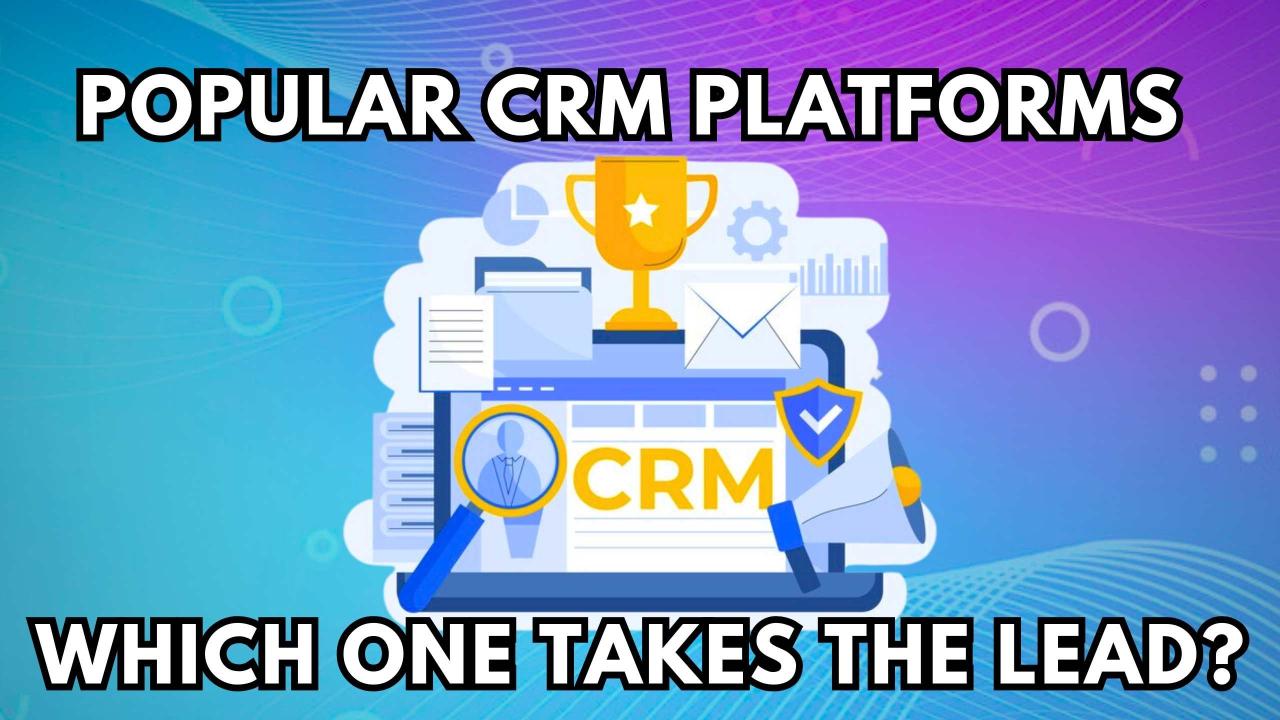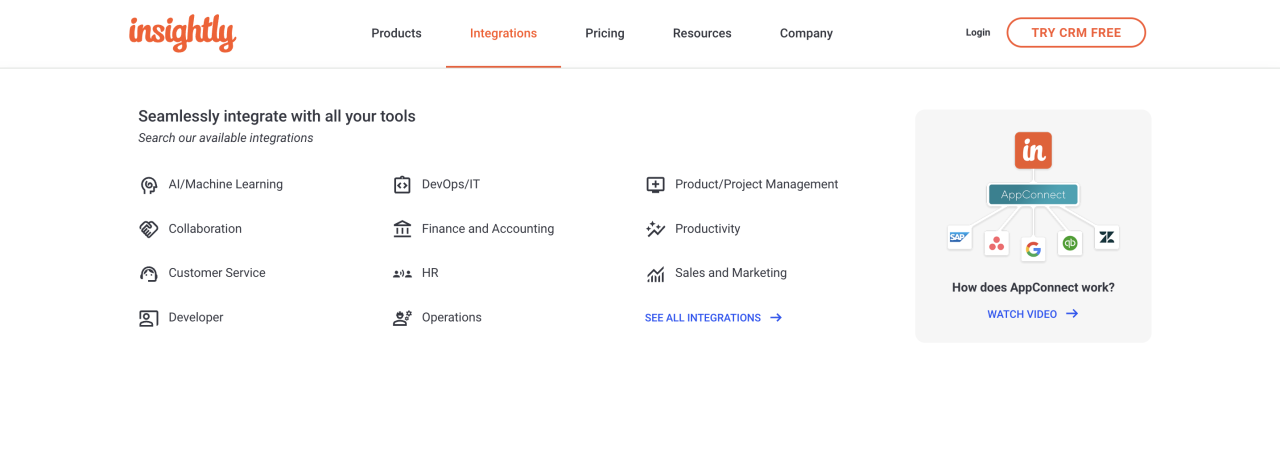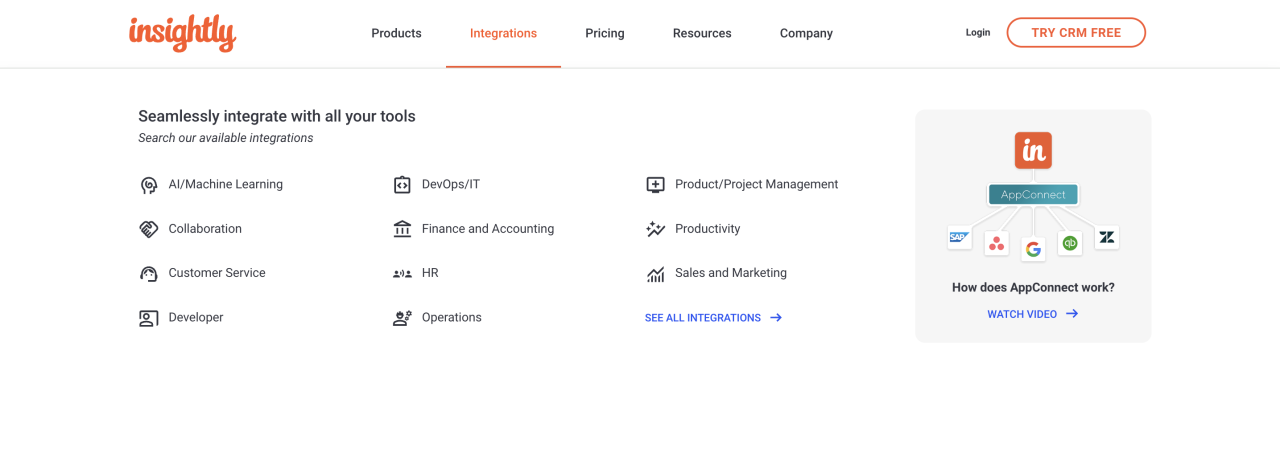Popular CRM platforms are essential tools for businesses aiming to optimize customer interactions and drive growth. This guide delves into the diverse landscape of CRM solutions, exploring their functionalities, benefits, and pricing models.
From sales and marketing automation to service management, CRM platforms offer a range of capabilities to streamline processes and foster stronger customer relationships. We’ll examine popular choices, comparing their strengths and weaknesses, to help you choose the right solution for your specific business needs.
Introduction to CRM Platforms
Customer Relationship Management (CRM) software is a powerful tool for businesses of all sizes to manage and improve their interactions with customers. It centralizes customer data, enabling businesses to better understand their clients’ needs, preferences, and behaviors. This streamlined approach leads to enhanced customer satisfaction and ultimately, increased profitability.CRM systems offer a comprehensive suite of functionalities that streamline various business processes, such as sales, marketing, and customer service.
These functionalities improve efficiency, allowing businesses to focus on building stronger relationships with their clients and driving revenue growth. The integration of data from multiple sources within a CRM platform provides a holistic view of the customer, leading to more targeted and effective strategies.
Core Functionalities and Benefits of CRM Systems
CRM systems offer a wide range of functionalities designed to enhance customer relationships and drive business growth. These functionalities include: contact management, sales force automation, marketing automation, customer service management, and analytics. Contact management helps organize and track customer interactions, sales force automation streamlines the sales process, and marketing automation automates marketing campaigns. Customer service management facilitates efficient resolution of customer issues, and analytics provide valuable insights into customer behavior.The benefits of using CRM systems extend beyond improved efficiency.
CRM systems foster a better understanding of customer needs, leading to more personalized interactions and increased customer loyalty. This understanding of customer behavior also empowers businesses to tailor their products and services to meet specific customer requirements, ultimately boosting sales and profitability.
Types of CRM Platforms
CRM platforms are categorized into various types based on their primary functions. These categories include sales CRM, marketing CRM, and service CRM, each catering to distinct business needs.
- Sales CRM: This type of CRM focuses on automating and optimizing sales processes. It includes functionalities like lead management, opportunity tracking, sales forecasting, and sales reporting. Sales CRM tools empower sales teams to effectively manage leads, close deals, and analyze sales performance. A well-implemented sales CRM can improve sales productivity and shorten sales cycles, leading to higher conversion rates and increased revenue.
- Marketing CRM: Marketing CRM platforms are designed to streamline marketing campaigns and personalize customer interactions. This includes features like campaign management, email marketing, social media marketing, and customer segmentation. Effective use of marketing CRM tools can lead to increased customer engagement, improved campaign ROI, and a stronger brand presence.
- Service CRM: Service CRM platforms concentrate on enhancing customer service and support. They often include functionalities like ticket management, knowledge bases, and customer self-service portals. This type of CRM enables businesses to respond promptly to customer inquiries, resolve issues efficiently, and build lasting customer relationships.
Examples of Popular CRM Platforms
Several popular CRM platforms cater to diverse industries and business needs. Some prominent examples include Salesforce, HubSpot, Zoho CRM, Microsoft Dynamics 365, and SugarCRM. These platforms offer a range of features and functionalities to address specific business requirements, from small businesses to large enterprises. These platforms cater to various industries, including retail, finance, healthcare, and technology.
Comparison of CRM Platforms
| Category | Description | Examples | Key Features |
|---|---|---|---|
| Sales CRM | Focuses on automating and optimizing sales processes, managing leads, opportunities, and sales forecasting. | Salesforce, HubSpot Sales Hub, Zoho CRM | Lead management, opportunity tracking, sales forecasting, sales reporting, contact management |
| Marketing CRM | Streamlines marketing campaigns, personalizes customer interactions, and manages customer segmentation. | HubSpot Marketing Hub, Pardot, Marketo | Campaign management, email marketing, social media marketing, customer segmentation, analytics |
| Service CRM | Enhances customer service and support, facilitating efficient issue resolution and knowledge management. | Zendesk, Salesforce Service Cloud, Freshdesk | Ticket management, knowledge bases, customer self-service portals, customer support analytics |
Key Features and Benefits of Popular CRMs
Customer Relationship Management (CRM) platforms are essential tools for businesses to manage and nurture customer interactions. These platforms offer a range of features that streamline processes, enhance communication, and ultimately, boost business growth. By effectively organizing customer data and automating tasks, CRMs help companies cultivate stronger relationships with their clients, leading to increased loyalty and profitability.
Sales Force Automation
Sales processes are often complex and time-consuming. CRM platforms automate crucial sales tasks, enabling sales teams to focus on building relationships and closing deals. Automated tasks include lead qualification, opportunity tracking, and sales forecasting. This streamlined approach significantly reduces manual effort, improving efficiency and allowing for a faster sales cycle. For example, a company using a CRM to automate lead nurturing might see a 20% increase in qualified leads compared to those relying solely on manual processes.
Marketing Automation
Effective marketing campaigns rely on targeted messaging and personalized interactions. CRMs facilitate automated marketing workflows, enabling companies to tailor communications to individual customer segments. Features like email marketing automation, social media scheduling, and targeted advertising campaigns improve engagement and conversion rates. For instance, a company using a CRM to automate email marketing campaigns might see a 15% increase in open rates and a 10% increase in click-through rates.
Customer Service Management
Customer service is crucial for maintaining customer satisfaction and loyalty. CRMs provide tools for managing customer inquiries, tracking issues, and resolving problems efficiently. Features like ticketing systems, knowledge bases, and live chat capabilities empower customer service representatives to resolve issues quickly and effectively. A company using a CRM to manage customer support tickets might experience a 10% reduction in average ticket resolution time.
Reporting and Analytics
Data-driven decision-making is critical for business success. CRMs offer robust reporting and analytics tools that provide insights into customer behavior, sales trends, and marketing campaign performance. This data allows companies to identify areas for improvement, optimize strategies, and make informed decisions. For instance, a company using CRM analytics to track sales trends might identify a seasonal fluctuation in sales and adjust their marketing strategies accordingly.
Frequently Asked Questions About Popular CRM Platforms
- What are the common security concerns when using CRM platforms?
- Data breaches and unauthorized access are potential security risks associated with CRM platforms. Robust security protocols, including encryption, access controls, and regular security audits, are crucial for protecting sensitive customer data. Data encryption and multi-factor authentication are crucial safeguards against unauthorized access.
- How can CRM platforms improve customer satisfaction?
- By streamlining communication, providing personalized experiences, and resolving issues efficiently, CRMs can significantly improve customer satisfaction. Features like personalized support and self-service portals empower customers and reduce frustration. The resulting positive customer experiences often lead to increased loyalty and advocacy.
- What are the different types of CRM platforms available?
- CRM platforms are available in various forms, including on-premise, cloud-based, and open-source solutions. On-premise CRMs offer more control over data storage, while cloud-based CRMs provide greater scalability and accessibility. Open-source CRMs offer flexibility and customization.
Industry-Specific CRM Solutions

Beyond generic CRM platforms, specialized solutions cater to the unique needs of various industries. These platforms often incorporate pre-built functionalities and data models optimized for specific workflows, regulatory compliance, and industry-standard practices. This tailored approach streamlines processes and enhances efficiency, ultimately improving ROI for businesses operating within particular sectors.
Examples of Industry-Specific CRMs
Several CRM platforms are designed to meet the distinct requirements of specific industries. For instance, healthcare CRMs prioritize patient data privacy and security, while retail CRMs focus on managing inventory, promotions, and customer loyalty programs. Financial services CRMs emphasize compliance with financial regulations and maintaining accurate transaction records. These platforms are not simply rebranded versions of generic CRMs; they are meticulously designed to address the specific pain points and opportunities of each industry.
Healthcare CRM
Healthcare CRMs are built with robust patient data management capabilities, ensuring compliance with HIPAA regulations. Key features include secure patient records, appointment scheduling, electronic health records (EHR) integration, and communication tools. These features streamline administrative tasks, improve patient care coordination, and reduce administrative costs.
Retail CRM
Retail CRMs are tailored to optimize inventory management, track customer preferences, and support sales promotions. Features often include detailed product information, customer segmentation tools, marketing automation, and sales forecasting capabilities. This enables retailers to effectively manage their stock, target their marketing efforts, and enhance customer engagement.
Financial Services CRM
Financial services CRMs are designed to comply with strict financial regulations. These systems often feature robust security protocols, advanced reporting capabilities, and sophisticated compliance tools. Features also include customer relationship management, transaction tracking, and fraud detection. This approach ensures accurate record-keeping, reduces operational risks, and facilitates regulatory reporting.
Table Summarizing CRM Solutions for Different Industries
| Industry | Relevant CRM | Key Features | Use Cases |
|---|---|---|---|
| Healthcare | Epic, Allscripts, Athenahealth | Secure patient data management, appointment scheduling, EHR integration, communication tools | Patient record management, appointment reminders, streamlined communication between staff and patients |
| Retail | Salesforce, SAP Hybris, Microsoft Dynamics 365 | Inventory management, customer segmentation, marketing automation, sales forecasting | Managing product stock, targeted marketing campaigns, enhancing customer engagement |
| Financial Services | Salesforce, Microsoft Dynamics 365, SAP CRM | Robust security protocols, advanced reporting, compliance tools, customer relationship management | Customer account management, transaction tracking, regulatory reporting |
| Real Estate | Propertybase, RealPage, AppFolio | Property management, tenant communication, lease management, marketing automation | Property management, tenant communication, lease management, marketing automation |
Future Trends in CRM

The CRM landscape is constantly evolving, driven by technological advancements and changing customer expectations. Modern businesses need to adapt to these shifts to maintain competitive advantage and foster stronger customer relationships. This section examines emerging trends, their impact on customer management, and how popular CRM platforms are responding.
AI-Powered Personalization
AI is revolutionizing CRM by enabling highly personalized customer experiences. Sophisticated algorithms analyze vast amounts of customer data, including purchase history, browsing behavior, and interactions with support teams, to anticipate customer needs and preferences. This proactive approach allows companies to deliver targeted offers, customized content, and proactive support, leading to higher customer satisfaction and loyalty. For example, Netflix uses AI to recommend movies based on viewing history, effectively personalizing the user experience.
Similarly, e-commerce companies use AI-powered chatbots to answer customer questions and provide instant support, further enhancing the customer journey.
The Rise of Conversational CRM
Conversational interfaces, such as chatbots and messaging apps, are becoming increasingly important in customer interactions. This shift towards conversational CRM provides customers with faster and more convenient ways to interact with businesses. Companies can leverage these channels to streamline customer service, gather feedback, and proactively address issues, leading to improved efficiency and customer satisfaction. Many businesses are integrating chatbots into their CRM systems to handle routine inquiries, freeing up human agents to handle more complex issues.
Live chat functions integrated directly into CRM platforms are becoming more common, allowing for real-time support and immediate responses.
Integration with Other Technologies
The future of CRM lies in seamless integration with other technologies, such as marketing automation, e-commerce platforms, and social media channels. This integration creates a unified view of the customer, enabling businesses to gather comprehensive data from various touchpoints and tailor their interactions accordingly. For instance, a CRM system can automatically update customer profiles with information from social media interactions, allowing for a more complete understanding of the customer’s needs and preferences.
A CRM platform integrated with marketing automation software can track the effectiveness of marketing campaigns and personalize messaging based on customer behavior. The interconnectedness of data and processes streamlines operations and allows for a more holistic customer journey.
Enhanced Data Security and Privacy
As the volume and complexity of customer data increase, so does the importance of robust data security and privacy measures. Modern CRM platforms need to incorporate advanced security features to protect sensitive customer information and comply with evolving data privacy regulations. This includes encryption, access controls, and compliance with regulations like GDPR. Companies must prioritize data security to build trust with customers and avoid potential reputational damage.
Examples include two-factor authentication, data encryption, and regular security audits. CRM platforms are increasingly adopting these security measures to protect customer data and maintain compliance.
The Impact of the Metaverse
The metaverse presents new opportunities for CRM interaction. Businesses are exploring virtual and augmented reality (VR/AR) environments to create immersive customer experiences, allowing for interactive product demonstrations, virtual showrooms, and personalized interactions. CRM platforms will likely need to adapt to support these new interaction models and virtual customer interactions. Early examples include virtual showrooms and interactive product demonstrations within gaming or social media environments.
As metaverse technologies mature, CRM systems will likely integrate virtual interactions into their functionalities.
Epilogue
In conclusion, selecting the right CRM platform is crucial for maximizing efficiency and fostering customer loyalty. This guide has provided a thorough overview of popular CRM options, their key features, and essential considerations for implementation. Ultimately, the best CRM platform is one that seamlessly integrates with your business processes and supports your long-term growth objectives.
Expert Answers
What are the common pricing models for CRM platforms?
Pricing models for CRM platforms vary. Many offer tiered subscription plans, with features and support levels increasing as the price point escalates. Some platforms also offer custom pricing based on the number of users or the volume of data handled.
How do I determine which CRM platform is best for my business?
Several factors influence the optimal CRM choice, including business size, industry, specific needs (e.g., sales automation, marketing campaign management), and budget. Carefully assess your needs and compare the features and functionalities of different platforms before making a decision.
What are the typical integration capabilities of CRM platforms?
Modern CRM platforms offer various integration options. They often integrate with other business applications like email marketing tools, accounting software, and customer support systems. This allows for a seamless flow of information and improves overall operational efficiency.
What are some of the industry-specific CRM solutions available?
Numerous CRM platforms cater to particular industry needs. For example, some are tailored for retail, while others are designed for healthcare or finance. These platforms often include specialized features that address industry-specific workflows and compliance requirements.






